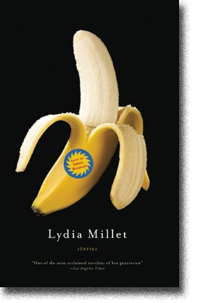More Interviews: Max Barry |
An Interview with Lydia MilletAuthor of Love in Infant Monkeys: Stories
This interview was conducted by Guy Savage for MostlyFiction.com (MF). Read Savage's review of LOVE IN INFANT MONKEYS as well as Poornima Apte's review of HOW THE DEAD DREAM.
LYDIA MILLET: Frankly it’s felt slow to build, if you consider I’ve published seven books.
MF: What led you to create the short story collection LOVE IN INFANT MONKEYS? LYDIA MILLET: George Adamson’s autobiography My Pride and Joy. I read it and wanted to write about him and his devotion to his lions — his solitary, hermitlike life out in the African wild and the animals that he loved — and the rest of the stories followed from that one.
MF: What sort of research was involved for the factually based stories? LYDIA MILLET: Just some combing through old media on the internet, some perusal of biographies. The facts were ideas.
MF: How would you describe humanity’s relationship with animals? LYDIA MILLET: Passionate and conflicted and worshipful and devoted and perverse and tender and fetishistic and brutal.
MF: Would you agree that people are fascinated by celebrities’ relationships with their pets, and if so how do you explain that fascination? LYDIA MILLET: I don't do a lot of celebrity watching in my everyday life, because they’re so boring for the most part. I mean, Hollywood type celebrities. So I don’t know how true that is. But I imagine, if it is the case, that celebrity-pet relations offer the public yet another forum for judgment, like their children and their marriages, which is what we most value celebrities for — in order to judge them and then delight in our own judgments.
MF: What sort of feedback have you received on the book? LYDIA MILLET: I’ve been surprised by the number of reviews that have hastened to reassure readers that the stories are really about people, not animals. I’m continually shocked by the myopic style of humanism of the U.S. media and even intelligentsia — the common assumption that we’re the center of the universe and all serious art should finally be about us. It’s very prerevolutionary. Like, pre-Copernican revolution. There’s a repulsive quality to it. Take for instance a recent New York Times review of Safran-Foer’s new book on eating animals: I haven’t read the tome, but the reviewer’s attack on it from a moral position that asked “how can we talk about cruelty to animals when actual people are starving” was moronically stupid.
MF: Your stories explore some emotional issues — animal experimentation for example, and yet you manage to remain objective and not judgmental. Was this a deliberate decision? How did you achieve your objectivity? LYDIA MILLET: I’m not objective, I don’t try to pretend to be, but I’m flattered you could think that even for a minute.
MF: What’s next? LYDIA MILLET: I have the next two books in my trilogy finished, the one that started last year with How the Dead Dream. They’re called Ghost Lights and Magnificence. I also have a series for middle readers and some so-called young adult fiction I’m working on that’s very exciting to me.
MF: Great! We already have our hand raised for a review copy of GHOST LIGHTS! Thank you for taking the time to talk to us. |
|
Read our review of LOVE IN INFANT MONKEYS at MostlyFiction.com
|
©1998-2012 MostlyFiction.com |


